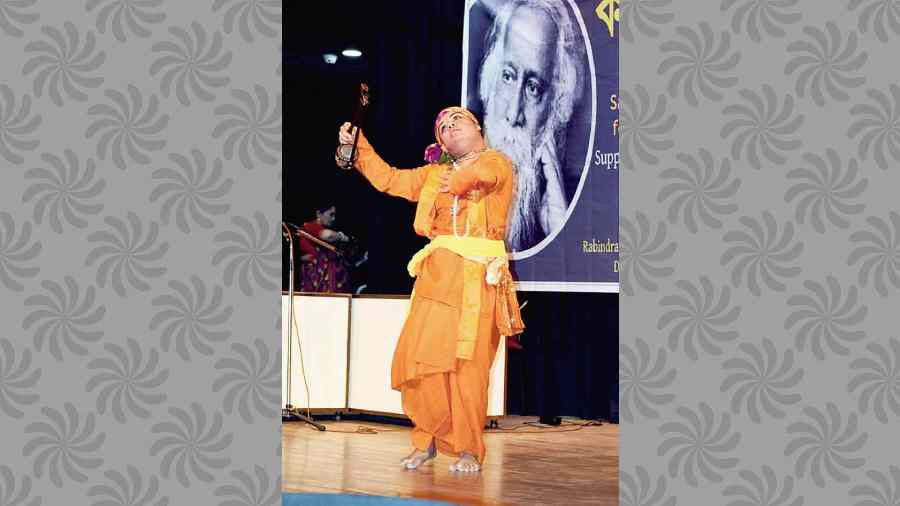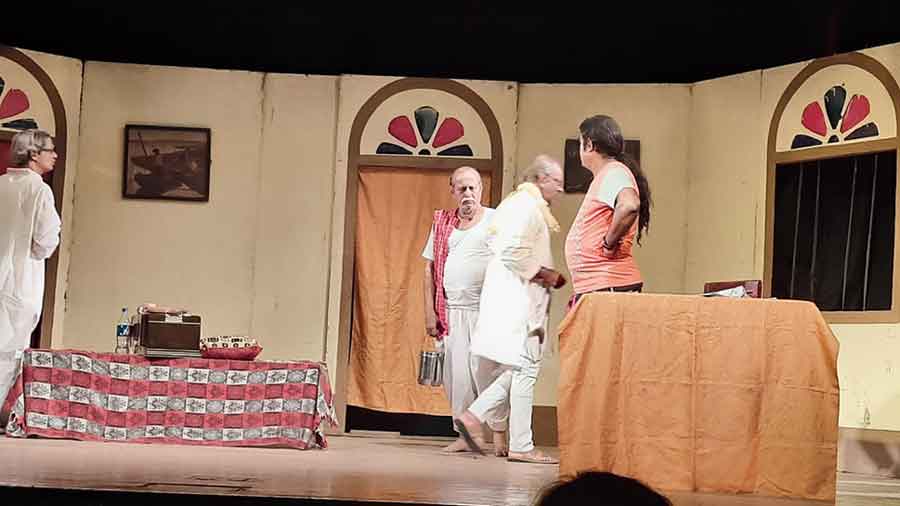Township-based theatre group Britya presented a political drama at Rabindra Okakura Bhavan recently.
Written by Sangramjit Sengupta and directed by Bijan Ghosh, Kalbaisakhi was about election malpractice. Nandini, a reporter covering the elections, witnesses and records violence on her camera but is spotted by the miscreants and chased.
The rest of the play is about how she escapes to a music teacher Abanish’s house and how he helps her deliver the footage to her TV channel and expose the truth. People from all walks of life then come together and participate in a rally to protest the incident.
“Theatre holds up a mirror to society and we chose this topic as it is our duty as a theatre group to reflect contemporary society,” explained Ghosh, the director. “For the past 35 years, we have staged various productions on different subjects and now we wanted to highlight the role of the fourth pillar of democracy.”
Shilpi Chakraborty, who played Nandini, said the role required a lot of practice and preparation. “I am a teacher by profession and associated with Britya since 2012 but this was the first time that I had the opportunity to play such a challenging role in a political plot,” she said.
Arup Ghosh, who played the role of Abanish, felt the play received positive feedback because it was topical. “The playwright wanted to highlight the fact that whoever comes to power misuses it but like the destructive Nor’wester (Kalbaisakhi), injustice too cannot continue for long. It gets exposed and is punished,” he said.
Before the play was staged, elocutionist Shampa Sarkar recited Tagore’s Tran from Naibedya, Sudhu bhanga noi by Subhash Mukhopadhyay and Salil Chowdhury’s Shapath, based on the Tebhaga movement. There was also an audio drama, titled Jora Sukh, written by Bijan Ghosh and enacted by Ashoke Adhya and Kaberi Pal.
Bharati Kanjilal
A special tribute

Korok Biswas dressed as a baul at the Drishti show
A mute girl danced to Tagore’s Gahana kusum, a boy with Down Syndrome danced to Tomaar chhobi neel akashey and the audience was amazed to see the talent of the special children at their Rabindrajayanti.
Drishti, the CE Block-based school for special children, had hosted the evening at Rabindra Okakura Bhavan to pay tribute to the bard.
Pratibha Hazra danced impromptu to a song sung by guest artiste Brijesh Chattopadhyay, following lip instructions from her mentor Sushmita Nag, who runs the institute.
Dipanwita Ghosh, a member of the audience, said she was stunned to see the performance. “The girl danced without any rehearsal! Her expressions, postures and neck movements indicated clearly that she was using Bharatnatyam steps,” Ghosh said.
The mute dancer’s mother Banasree Hazra confirmed that Pratibha, her younger daughter, was a trained dancer. “She is studying in Class XII. She can hear a bit using a machine.”
There was also Korok Biswas, a 19-year-old boy with Down Syndrome. His first dance to the song Tomaar chhobi neel akashey was one he has presented even on an international stage. “Korok performed this in Bangladesh when he was invited by Shilpokola Academy, Kushtia and also at the Dhaka University grounds, on invitation from the Bangladesh Book Club in 2019,” said his mother Sarama Biswas.
Korok, she said, was a restless child till the age of 10. “We tried different kinds of therapy but it was dance that finally worked for him. He likes dancing and is much better now,” said Biswas. “He will appear for his Madhymik exams soon from the National Institute of Open Schooling.”
There were several performances by guest artistes too. Nag said she was happy that her students had proved on stage how capable they were. “It also boosted the confidence of other children who watched but could not perform this time. These students and their parents hardly get opportunities of outings or attending cultural shows like this.”
Bharati Kanjilal
